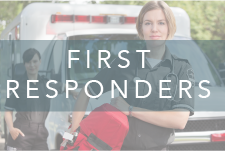How First Responders Are Prepared to Deal With Trauma
- Nov 7, 2020
- 8 min read
Updated: Sep 2, 2025

You understand the unique pressures faced by first responders. We've got the expertise to show you how to navigate the mental and emotional challenges that come with the job. You'll discover concrete strategies for building resilience, addressing trauma, and fostering a healthier, more balanced life.
What are some ways first responders can cope with daily stress and trauma?
First responders can cope with daily stress and trauma by prioritizing their mental health. This includes establishing consistent routines, practicing daily grounding strategies, and learning how to confront feelings of guilt. Additionally, they should work as a team and seek support from their family and peers.
The challenges of being a first responder don’t stop when the shift ends. Delve deeper to learn how you can overcome barriers to seeking help and build a strong support system for yourself and your loved ones.
What Mental Health Support Do First Responders Need to Cope with Trauma?
First responders prepare to deal trauma daily while serving our communities, often seen as pillars of strength and safety in high-pressure situations. Their role requires maintaining composure and control even in the most intense environments.
But behind that strength, they face real mental and emotional challenges. The nature of their work places their mental health at just as much risk as their physical well-being. With consistent trauma and crisis training, along with resilience-building support for them and their families, first responders can lay the foundation for healthier and more balanced lives.
Providing this information and breaking down stigmas that still surround mental health and trauma treatment can instill necessary preventative measures for first responders, as well as open each officer up to the importance of crisis response training mental health for themselves and others.
Coping with the daily traumas that first responders may see is a difficult task. However, taking one’s mental health seriously and one day at a time can go a long way in helping cope with daily stress, trauma, or PTSD.
First Responders Prepare to Deal Trauma: Overcoming Barriers
Working as a first responder inherently comes with many risks. While much training is put into being able to physically cope with an array of different life-threatening situations, these risks also take a large mental toll and are a huge source of first responder stress.
However, this topic is discussed much less often. There can be several barriers that may prevent someone from talking about their mental health. Whether it is to daily continue presenting the image of a strong figure, or if someone is feeling shameful in the idea that they need help, these barriers can make getting help difficult.
Overcoming these barriers means directly addressing many of the stigmas that still surround mental health and therapy. Yet with the nature of one’s life as a first responder, trauma can be ever-present, and normalizing the need for help is paramount for the health of all involved. The existence of the stigma surrounding reaching out for mental health counseling is something that perpetuates itself. Overcoming the barriers that may be present for any one person to reach out begins with having an honest conversation.
Whether they are talking to superiors about effective programs that help police officers deal with stress (such as CISM or specialized centers that cater to the unique problems of first responders) or involving their family to begin allowing themselves to experience their human side, overcoming barriers begins with a willingness for someone to speak to understanding peers who will listen.
Incorporating the Family

Talking about one’s struggles with traumatic experiences with supportive family or friends at home can help someone begin to normalize themselves with letting down their guard and discussing the persistent issues they may face every day.
Families are often unconditionally understanding, and are in the unique position where they can see first responders both as heroes who exude strength and safety, as well as regular people who have their own needs. Talking about these issues on a familial front can both help others understand the kind of support that first responders may need, as well as help them set expectations for themselves through stressful times.
Prepare Early
It can be impossible to know when a traumatic event may strike, or even which traumatic events will stick with someone more than others. Learning how to be prepared for trauma involves setting up a plan early. Whether someone is doing research on support groups specifically for first responders or setting up a method of relaxation and self-care, having systems in place for when you may need them can take some of the stress out of any situation.
Looking for options and outlets while someone is experiencing symptoms of PTSD, stress, or anxiety can be a difficult task, and can feel overwhelming when trying to tackle all of it at once. Having a plan alongside family and friends already in place can help you make clear decisions on how you can help yourself during times of crisis.
Practice Daily Routines
Dealing with unexpected stresses can be very difficult to cope with. However, it is also part of the job description for a first responder. As a result, it is important to find structure and consistency in one’s day wherever you can.
Feeling like things are constantly in motion or otherwise out of your control can create a stressful atmosphere, and daily routines and practices are one of the best ways to address the hectic nature of your day. Keeping as many elements as possible consistent, such as mealtimes, bedtimes, setting scheduled time for yourself to decompress — even just by watching a television show — can all provide a key element of structure to one’s day.
By keeping these things as consistent as possible, you can always feel like you have a safety net and a sense of familiarity to fall back on, even during times of stress or after traumatic events.
Practice Grounding Strategies Daily
Constantly grounding oneself in the real world is also an essential practice as you are preparing to deal with trauma. Even on a daily basis, whether you are at home or work, reaffirming one’s environment and its elements can prepare you to use the technique during high-stress scenarios.
Naming elements of one’s environment out loud or to yourself, such as “chair,” “desk,” “mug,” can help condition you to be able to employ such grounding techniques amidst potentially traumatic events.
Practices for Confronting Guilt
Unfortunately, guilt is a prominent feeling for first responders. It is common to wonder if there was a better way to handle a situation or to feel like you failed on a personal level if a colleague or civilian was hurt during a dangerous event.
The constant barrage of “what ifs” can take a massive toll on one’s mental health, and can introduce self-doubt into an already fragile situation. Hanging onto these feelings can cause any number of difficulties through your daily life, so confronting guilt and its reality is a crucial part of being prepared.
Making lists is a common way for someone to objectively view their situation. Making a list of things that you can and cannot control can be a way for someone to relieve themselves of some of the feelings of guilt that may have plagued their thoughts. It can provide a list of key things that they can control in any given situation, and provide a way for them to fairly portray themselves amidst traumatic experiences.
Keeping journals of one’s experiences is also highly recommended. Journals provide a private outlet for someone to express their struggles and emotions without worrying about societal stigmas while also acting as a record of all the ways in which someone has helped those around them. Traumatic situations can cloud someone’s memory of the good that they have done for a community, and being able to fairly judge oneself means having a way to remind themselves of all the good they have done regularly.
Keep Working as a Team
Being prepared for trauma doesn’t mean that anyone is immune to it. However, nobody ever has to go through it alone. Much of the training for first responders involves learning how to work as a team, support each other, and how to manage a situation as one unit.
This practice doesn’t have to end once someone gets off their shift. Whether someone is dealing with a traumatic situation, physical trauma, or mental crisis, teamwork and communal support are necessary at all times. Being prepared to deal with traumatic events involves deconstructing the notion that getting mental support is somehow a sign of “weakness,” and instead, an issue that affects everyone.
Learning to support each other shows that not only is someone allowed to let down their guard and be supported, but also that they are allowed to be human just as often as they are expected to be heroes.
Frequently Asked Questions
• What are some of the barriers that prevent first responders from seeking mental health support?
Barriers to seeking mental health support include the desire to maintain an image of strength, as well as feelings of shame associated with needing help.
• Why is it important to incorporate family into a first responder’s mental health plan?
Involving family helps a first responder normalize letting their guard down and discussing their struggles. It also helps family members understand the kind of support they may need.
• How can daily routines help a first responder cope with stress?
Daily routines and practices, such as consistent mealtimes and bedtimes, can provide a sense of structure and familiarity, which helps counter the hectic nature of the job.
• What is a grounding strategy, and how can it help?
A grounding strategy involves reaffirming one's environment by naming objects around you. This can help first responders stay present and focused during high-stress scenarios.
• How can first responders confront feelings of guilt?
First responders can confront feelings of guilt by making a list of things they can and cannot control in a situation. Keeping a journal is also helpful for objectively viewing their experiences and remembering the good they've done.
We recognize the immense courage and dedication that first responders show every day, and we're committed to providing the specialized support you deserve. At Chateau Health and Wellness Treatment Center, our team understands the unique challenges of your profession, and we offer a safe, confidential space to address trauma and build resilience. We're here to help you navigate these issues with a supportive, empathetic approach. Please don't hesitate to reach out to our team at (435) 222-5225; we are here to support you in taking this vital step toward a healthier and more balanced life.

About The Author
Ben Pearson, LCSW - Clinical Director
With 19 years of experience, Ben Pearson specializes in adolescent and family therapy, de-escalation, and high-risk interventions. As a former Clinical Director of an intensive outpatient program, he played a key role in clinical interventions and group therapy. With 15+ years in wilderness treatment and over a decade as a clinician, Ben has helped countless individuals and families navigate mental health and recovery challenges.
Danny Warner, CEO of Chateau Health and Wellness
Brings a wealth of experience in business operations, strategic alliances, and turnaround management, with prior leadership roles at Mediconnect Global, Klever Marketing, and WO Investing, Inc. A graduate of Brigham Young University in Economics and History, Danny has a proven track record of delivering results across diverse industries. His most transformative role, however, was as a trail walker and counselor for troubled teens at the Anasazi Foundation, where he directly impacted young lives, a personal commitment to transformation that now drives his leadership at Chateau.
Austin Pederson, Executive Director of Chateau Health and Wellness
Brings over eight years of experience revolutionizing mental health and substance abuse treatment through compassionate care and innovative business strategies. Inspired by his own recovery journey, Austin has developed impactful programs tailored to individuals facing trauma and stress while fostering comprehensive support systems that prioritize holistic wellness. His empathetic leadership extends to educating and assisting families, ensuring lasting recovery for clients and their loved ones.









